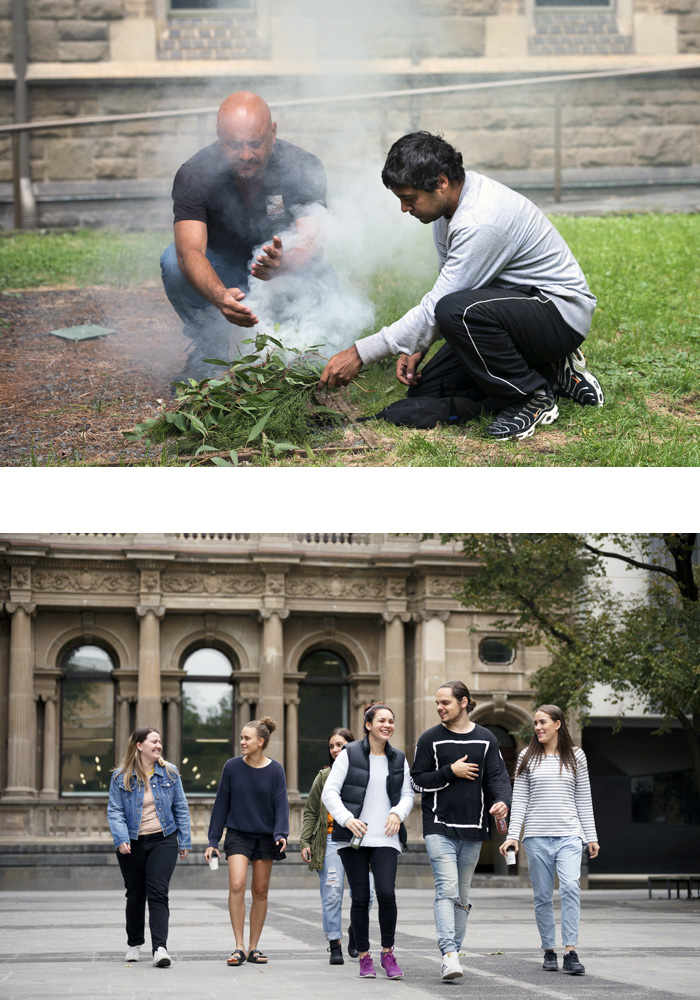Indigenous Studies
Indigenous Studies is an exciting interdisciplinary program that offers teaching and learning, and research activities that critically engage with the rich history, knowledge and cultures of Indigenous peoples both in Australia and globally. We ask students to consider how the knowledge and experience of Indigenous peoples might provide new insight and understandings to the complex issues and problems that confront contemporary western societies today.
We acknowledge the Wurundjeri People of the Kulin Nations as the owners of the land on which we teach and research. We acknowledge Kulin Nations Elders and leaders past, present and emerging. We acknowledge that Kulin Nations Sovereignity of this Country has never been ceded. We acknowledge the Wurundjeri People of the Kulin Nations as the owners of the Parkville campus on which we teach and research.

Indigenous Studies at Melbourne
Relaunched in 2020 to focus on contemporary issues in ways that relate locally grounded insights to world-wide issues and concerns our program seeks to understand the social, economic and political challenges that confront the world today from the points of view articulated by Indigenous peoples.
As a team of Indigenous and non-Indigenous scholars, we teach Indigenous Studies as a critical engagement of disciplinary knowledges produced by the Academy and challenge the various truth claims it makes in respect of Indigenous peoples. We teach Indigenous Studies for a sustainable future and challenge simplistic understandings of history, culture and race relations in politics, academia and society more broadly.
Globally focused and professionally oriented, we explore the following areas
- Indigenous Biogeography and Ecology (including fire and water management)
- Indigenous Languages
- Indigenous Design and Engineering
- Indigenous Cultural Heritage
- Indigenous Creative Writing, Art and New Media
- Indigeneity and Gender
- Indigenous Activism
- Race and whiteness
- Indigenous Knowledges and Philosophies
- Indigenous Histories
Our work is built on our growing relationship with the Wurundjeri People of the Kulin Nations and their Council, on whose lands we research and teach. We are committed to the ongoing development of a respectful, localised agenda of collaborative and Kulin Nations facilitated subjects that showcase on Country experiential learning and shape our growing research activity.
Featured research
Our research engages with a wide audience through industry and community partnerships, and is supported by a range of funding sources, including the Australian Research Council (ARC).
-
Incentivising On Country Aboriginal Employment: Anangu Futures
This project analyses the complex social, political and economic conditions that have enabled the Indigenous community of Mutitjulu to endure ongoing and extreme economic and social marginalisation.
-
Indigenous mobilities to and through Australia: agency and sovereignties
This project will create previously unwritten histories of Indigenous travel to and through Australia, exploring the historical mobilities of Aboriginal peoples, Torres Strait Islanders, Maori and Pacific Islanders through three targeted case studies.
-
First Nation’s Media Australia research
The Centre for Advancing Journalism (CAJ) is working with First Nations Media Australia (FNMA) on research to measure the reach and impact of Indigenous broadcasting channels and services across remote, regional and suburban Australia.
View a selection of writing from current staff
- Lily Brown - In My Blood It Runs challenges the ‘inevitability’ of Indigenous youth incarceration
- Lily Brown - Why we need to educate journalists about Aboriginal women’s experience of family violence
- Barry Judd - After the climb: how new tourism opportunities can empower the traditional owners of Uluru
- Barry Judd - The Aboriginal football ethic: where the rules get flexible
- Barry Judd, Rachel Standfield and Kat Ellinghaus - Unaipon: Behind the Da Vinci comparisons
- Lilly Brown, Odette Kelada and Dianne Jones - ‘While I knew I was raced, I didn’t think much of it’: the need for racial literacy in decolonising classrooms
Study with us
Once marginalised, the critical insights and learnings that Indigenous Studies provides students are now being sought across sectors and industries. Indigenous Studies is well positioned to compliment and bridge skills, capabilities and learnings that span the humanities and social sciences (HASS) and science, technology, engineering and maths (STEM). Indigenous Studies is also highly complementary to studies in the field of Law and the Health Sciences.
Undergraduate
Graduate coursework
- Graduate Certificate in Arts
- Graduate Diploma in Arts
- Graduate Certificate in Arts (Advanced)
- Graduate Diploma in Arts (Advanced)
Graduate research
- Master of Arts (Advanced Seminar and Shorter Thesis)
- Master of Arts (Thesis Only)
- Doctor of Philosophy – Arts
As an Indigenous Studies graduate, your qualification will be internationally recognised and transferable, providing vocational and research entry points into a multitude of Indigenous aligned or engaged governmental and non-governmental organisations, private sector corporations and businesses and universities worldwide.
Meet our Indigenous Studies staff
Staff of the Indigenous Studies Program are recognised both nationally and internationally for their teaching and research contributions to the field. We combine many years of teaching and research experience and draw on both academic and life experience to inform the student learning experience.
Indigenous members of staff represent many First Nations peoples and exemplify the diversity of Indigenous Peoples both nationally and globally.
We also respectfully acknowledge the contributions of the scholars who built this program before us. These include Professor Marcia Langton AO, Inaugural Chair of Indigenous Studies at The University of Melbourne whose work launched the program and helped transform this institution. Mr. Phillip Morrisey, a longstanding former Academic Co-ordinator of this program and Professor Paul Tapsell for strategic review work undertaken while Interim Director.
Prof Barry Judd
Dr Sheelagh Daniels-Mayes
